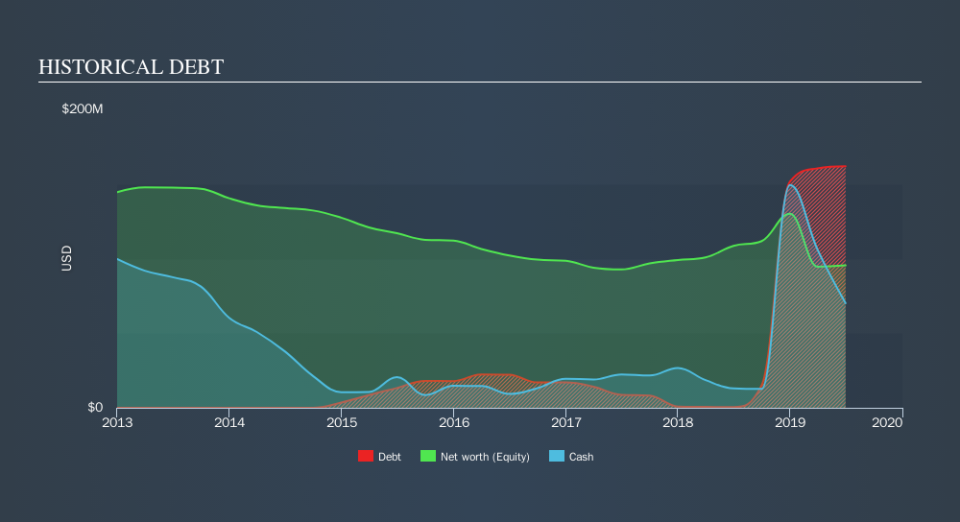Boingo Wireless (NASDAQ:WIFI) Is Making Moderate Use Of Debt

Legendary fund manager Li Lu (who Charlie Munger backed) once said, 'The biggest investment risk is not the volatility of prices, but whether you will suffer a permanent loss of capital. So it might be obvious that you need to consider debt, when you think about how risky any given stock is, because too much debt can sink a company. We can see that Boingo Wireless, Inc. (NASDAQ:WIFI) does use debt in its business. But should shareholders be worried about its use of debt?
When Is Debt A Problem?
Debt is a tool to help businesses grow, but if a business is incapable of paying off its lenders, then it exists at their mercy. If things get really bad, the lenders can take control of the business. While that is not too common, we often do see indebted companies permanently diluting shareholders because lenders force them to raise capital at a distressed price. Of course, the upside of debt is that it often represents cheap capital, especially when it replaces dilution in a company with the ability to reinvest at high rates of return. The first thing to do when considering how much debt a business uses is to look at its cash and debt together.
Check out our latest analysis for Boingo Wireless
How Much Debt Does Boingo Wireless Carry?
The image below, which you can click on for greater detail, shows that at June 2019 Boingo Wireless had debt of US$162.0m, up from US$15.2m in one year. However, because it has a cash reserve of US$70.2m, its net debt is less, at about US$91.8m.
How Healthy Is Boingo Wireless's Balance Sheet?
According to the last reported balance sheet, Boingo Wireless had liabilities of US$153.4m due within 12 months, and liabilities of US$357.2m due beyond 12 months. Offsetting these obligations, it had cash of US$70.2m as well as receivables valued at US$74.0m due within 12 months. So its liabilities total US$366.4m more than the combination of its cash and short-term receivables.
This is a mountain of leverage relative to its market capitalization of US$447.3m. This suggests shareholders would heavily diluted if the company needed to shore up its balance sheet in a hurry. The balance sheet is clearly the area to focus on when you are analysing debt. But it is future earnings, more than anything, that will determine Boingo Wireless's ability to maintain a healthy balance sheet going forward. So if you want to see what the professionals think, you might find this free report on analyst profit forecasts to be interesting.
In the last year Boingo Wireless wasn't profitable at an EBIT level, but managed to grow its revenue by17%, to US$268m. We usually like to see faster growth from unprofitable companies, but each to their own.
Caveat Emptor
Importantly, Boingo Wireless had negative earnings before interest and tax (EBIT), over the last year. Indeed, it lost US$4.4m at the EBIT level. Considering that alongside the liabilities mentioned above does not give us much confidence that company should be using so much debt. Quite frankly we think the balance sheet is far from match-fit, although it could be improved with time. Another cause for caution is that is bled US$71m in negative free cash flow over the last twelve months. So suffice it to say we consider the stock very risky. When I consider a company to be a bit risky, I think it is responsible to check out whether insiders have been reporting any share sales. Luckily, you can click here ito see our graphic depicting Boingo Wireless insider transactions.
If you're interested in investing in businesses that can grow profits without the burden of debt, then check out this free list of growing businesses that have net cash on the balance sheet.
We aim to bring you long-term focused research analysis driven by fundamental data. Note that our analysis may not factor in the latest price-sensitive company announcements or qualitative material.
If you spot an error that warrants correction, please contact the editor at editorial-team@simplywallst.com. This article by Simply Wall St is general in nature. It does not constitute a recommendation to buy or sell any stock, and does not take account of your objectives, or your financial situation. Simply Wall St has no position in the stocks mentioned. Thank you for reading.

 Yahoo Finance
Yahoo Finance 
